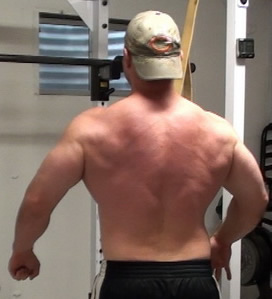Cluster
Training is simply one of THE most powerful
methods you can use for building
mass and strength.
 |
It's
essentially a way to postpone fatigue, allowing
you to get more reps with a certain weight
than you could with a straight-through set.
You
perform a small cluster of reps, take a short
rest, then another small cluster of reps,
then a short rest, then repeat for whatever
framework you're doing overall. Then you take
a longer rest (e.g. 2 to 3 minutes) then you
can repeat the cluster again.
Here's
what it might look like with the numbers.
If you were trying to target hypertrophy
with Cluster Training, this is a framework
you could use.
|
Select
a weight you could normally get 10 reps with then
perform reps in this fashion:
Mini-set
#1 - 4 reps
rest 10 seconds
Mini-set #2 - 4 reps
rest 10 sec.
Mini-set #3 - 4 reps
rest 10 sec
Mini-set #4 - 4 reps
rest 10 sec
Mini-set #5 - 4 reps
rest 10 sec
Mini-set #6 - 4 reps
Rest
2 minutes then repeat.
That
would be one Cluster set. By resting 10 seconds
between each mini-set (and the first 4 or 5 mini-sets,
you're not getting close to failure and you delay
the buildup of lactic acid and other waste products.
You also allow for a bit of "in-set" recovery,
which allows you to hit more reps within a shorter
period of time.
It's
a VERY effective way to build muscle.
For
STRENGTH, We
Turn to Single Rep Cluster Training
This
will be the same basic framework, only instead of
sets of 4 reps (as in the example above), you'll
be doing sets of ONE rep. Since the weights
will be heavier, the in-set rest periods will be
a bit longer (20 seconds) to allow for a bit more
recovery in between reps.
By
working at such a high intensity (as defined by
a high percentage of 1 RM), you're going to train
your nervous system to activate substantially more
muscle fibers. This single-rep rest-pause style
of training has been shown to increase muscle fiber
activation very effectively.
| REFERENCE:
Acute neuromuscular and fatigue responses to
the rest-pause method |
Journal
of Science and Medicine in Sport
Volume 15, Issue 2 , Pages 153-158, March 2012,
Paul W.M. Marshall, Daniel A. Robbins, Anthony
W. Wrightson, Jason C. Siegler |
Click
here to
read it |
The heavier loads are also going to strengthen your
connective tissue, which is a key limiting factor
that most people don't consider when trying to build
strength...after all, you're only as strong as your
weakest link, and if your connective tissue is weak,
THAT is what's going to hold you back.
This
type of training is going to get your body used
to and (prepared for) lifting very heavy weights.
Near-1RM training is NOT something your body inherently
knows how to do.
You
can't always do lower-load, higher-rep training
and expect to jump right in and safely hit a 1 Rep
Max. When you're getting close to maximal weight,
technique DOES change. Different muscles are going
to kick in when the emergency hits.
So
to maximize strength, we're going to make sure your
body knows what high-load training is all about.
How
Single Rep Cluster Training Fits into the Muscle
Explosion Program
This
program is all about STRATEGY.
The
last two weeks of the Muscle Explosion program are
the Intensification phase. This is where rest periods
increase and training volume decreases
to take advantage of the rebound you're getting
after the "massive overload" of Phase
2.
In
the first two training days, we're doing low-load,
high-tension training. This is easy on the nervous
system but tougher on the muscle fibers.
On
the third training day, we're targeting the weak
points of the same three lifts you'll be training
in the Single Rep Clusters. This is Time-Volume
Training, which is also relatively easy on the nervous
system. This is going to help fortify your weak
links for the heavy lifting and help you blast through
plateaus.
On
this fourth day of the program, we'll be using VERY
low training volume, very long rest periods and
near-max weight (which IS tough on the nervous system
but not as damaging to the muscle fibers as the
high-tension training is).
Put
together, these training styles will gradually bring
you down from the overtraining that you experienced
after that second "massive overload" week
of training.
During
this "coming down" phase is the PERFECT
time to perform this style of training.
Here's
what a typical Single Rep Cluster Set will look
like:
Mini-set
#1 - 1 rep
rest 20 seconds
Mini-set #2 - 1 rep
rest 20 sec.
Mini-set #3 - 1 rep
rest 20 sec
Mini-set #4 - 1 rep
rest 20 sec
Mini-set #5 - 1 rep
rest 20 sec
Mini-set #6 - 1 rep
This
will done with a weight around 90% to 95% of your
1 RM (approximately).


In
the program, you'll have one day per week of Single
Rep Cluster Training, targeting Squats, Deadlifts
and a Press (bench press or overhead press, whichever
you prefer). You'll be aiming for 4 to 6 reps per
set of each exercise.

